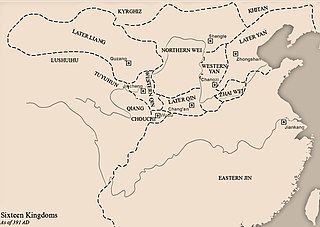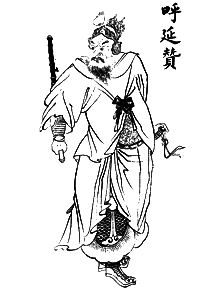Related Research Articles

Sima Guang, courtesy name Junshi, was a Chinese historian, politician, and writer. He was a high-ranking Song dynasty scholar-official who authored the monumental history book Zizhi Tongjian. Sima was a political conservative who opposed Wang Anshi's reforms.

Zizhi Tongjian is a pioneering reference work in Chinese historiography, published in 1084 AD during the Song dynasty in the form of a chronicle recording Chinese history from 403 BC to 959 AD, covering 16 dynasties and spanning almost 1400 years. The main text is arranged into 294 scrolls totaling about 3 million Chinese characters.

The Later Yan was a dynastic state ruled by the Xianbei people, located in modern-day northeast China, during the era of Sixteen Kingdoms in China.

Xia, known in historiography as Hu Xia (胡夏), Northern Xia (北夏), Helian Xia (赫連夏) or the Great Xia (大夏), was a dynastic state of Xiongnu origin established by Helian Bobo during the Sixteen Kingdoms period in northern China. Prior to establishing the Xia, the imperial clan existed as a tribal entity known as the Tiefu.

The Western Wei was a dynasty of China that followed the disintegration of the Northern Wei, and ruled northern China from 535 to 557. As with the Northern Wei dynasty that preceded it, the ruling family of Western Wei were members of the Tuoba clan of the Xianbei.

The Northern Zhou followed the Western Wei, and ruled northern China from 557 to 581 AD. The last of the Northern Dynasties of China's Northern and Southern dynasties period, it was eventually overthrown by the Sui Dynasty. Like the preceding Western and Northern Wei dynasties, the Northern Zhou emperors were of Xianbei descent.
Wen Chu (238–291), courtesy name Ciqian, better known as Wen Yang, was a military officer of the Jin dynasty of China. He previously served in the state of Cao Wei during the Three Kingdoms period. In 255, he participated in a rebellion in Shouchun started by his father, Wen Qin, and another Wei general, Guanqiu Jian. However, the rebellion was suppressed and Wen Qin and his family were forced to defect to Eastern Wu, Wei's rival state. In 257, when another rebellion broke out in Shouchun, Wen Qin and his sons led troops from Wu to support the rebel leader, Zhuge Dan. However, by 258, when the odds were against him, Zhuge Dan became increasingly suspicious of Wen Qin and eventually executed him. Wen Yang and his younger brother, Wen Hu (文虎), escaped from Shouchun and surrendered to the Wei regent, Sima Zhao, and assisted him in suppressing the revolt. Wen Yang continued serving under the Jin dynasty, which replaced the Wei regime in 266, and achieved fame for leading a successful military campaign against Xianbei forces in northern China. In 291, he was falsely accused of plotting a rebellion with Yang Jun, an ousted regent, and was arrested and executed along with his family.

Huyan Zan (呼延贊) was a Chinese military general in the early years of imperial China's Song Dynasty. He participated in Song's conquest of Later Shu Kingdom in 964-965 and Northern Han Kingdom in 979. Later he helped defend Song's northern border against the Khitan-ruled Liao Dynasty.
Emperor Xiaomin of Northern Zhou ( 周孝閔帝) (542–557), personal name Yuwen Jue (宇文覺), nickname Dharani (陀羅尼), was the founder of the Xianbei-led Northern Zhou dynasty of China, ruling as Heavenly Prince. He was the heir of Western Wei's paramount general Yuwen Tai, and after Yuwen Tai's death in 556, his cousin Yuwen Hu, serving as his guardian, forced Emperor Gong of Western Wei to yield the throne to Yuwen Jue in spring 557, establishing Northern Zhou. Later in 557, however, Yuwen Jue, wanting to assume power personally, plotted to kill Yuwen Hu, who in turn deposed him and replaced him with his brother Yuwen Yu. Later that year, Yuwen Hu had Yuwen Jue executed.
Gao Heng, often known in history as the Youzhu of Northern Qi ( 齊幼主), was briefly an emperor of Northern Qi. In 577, Northern Qi was under a major attack by rival Northern Zhou. Gao Heng's father Gao Wei, then emperor, wanted to try to deflect ill omens that portended a change in imperial status. He and therefore passed the throne to Gao Heng. Later that year, after they fled in face of Northern Zhou forces' arrival, they were captured and taken to the Northern Zhou capital Chang'an. There in winter 577, Emperor Wu of Northern Zhou ordered them, as well as other members of the Gao clan, to commit suicide. Northern Qi territory was seized by Northern Zhou, although for several years Gao Wei's cousin Gao Shaoyi claimed the imperial title in exile, under Tujue's protection.

Ninghai County is a county under the administration of Ningbo, in the east of Zhejiang province, People's Republic of China. It covers a land area of 1,712.50 km2 (661.20 sq mi) and a sea area 213.35 km2 (82.37 sq mi) of and has a 173.86 km (108.03 mi) coastline. It has four sub-districts, 11 towns, three townships and a population of 682,000.
Princess Taihe, later known as Princess Ding'an (定安公主) or Princess Anding (安定公主), was a princess of the Chinese Tang Dynasty and a Khatun (empress) of Huigu. She was married to Huige's Chongde Khan as part of the Heqin system of marriages between Tang princesses and Huigu khans, but suffered through Huigu's subsequent collapse before being welcomed back to the Tang court.
Du Cong (杜悰), courtesy name Yongyu (永裕), formally the Duke of Bin (邠公), was an official of the Tang dynasty of China, serving two terms as chancellor during the reigns of Emperor Wuzong and Emperor Wuzong's cousin Emperor Yizong. He was traditionally considered a skilled politician who maintained his high position throughout his lengthy career, but not a capable chancellor.
Cui Yanzhao, courtesy name Siwen (思文), was an official of the Chinese dynasty Tang Dynasty, serving as a chancellor during the reign of Emperor Xizong.

Cao Cao's invasion of Xu Province was a punitive invasion launched by the warlord Cao Cao against Tao Qian, the Governor of Xu Province, in the late Eastern Han dynasty. The casus belli for the invasion was the murder of Cao Cao's father, Cao Song, in Xu Province. Although Tao Qian's culpability was questionable, Cao Cao nonetheless held him responsible. The invasion took place in two separate waves in 193 and 194, during each of which Cao Cao captured a number of towns and engaged in collective punishment of the civilian populace.
Li Jihui, né Yang Chongben (楊崇本), was a warlord in the late Chinese dynasty Tang Dynasty and early Five Dynasties and Ten Kingdoms period state Qi, who ruled Jingnan Circuit as its military governor (Jiedushi).
The daughter of Emperor Xiaoming of Northern Wei, whose given name is unknown, was briefly the emperor of the Xianbei-led Chinese Northern Wei dynasty. She bore the surname Yuan, originally Tuoba. Yuan was the only child of Emperor Xiaoming, born to his concubine Consort Pan. Soon after her birth, her grandmother the Empress Dowager Hu, who was also Xiaoming's regent, falsely declared that she was a boy and ordered a general pardon. Emperor Xiaoming died soon afterwards. On 1 April 528, Empress Dowager Hu installed the infant on the throne for a matter of hours before replacing her with Yuan Zhao the next day. Xiaoming's daughter was not recognised as an emperor (huangdi) by later generations. No further information about her is available.
Li Jinquan was a military general during the Five Dynasties period, serving successively the Jin–Later Tang, Later Jin, and Southern Tang dynasties. He was of Tuyuhun ethnicity.
Xu Ci, courtesy name Rendu, was an official and scholar of the state of Shu Han in the Three Kingdoms period of China.
Kui An was an Indian military general and minister of Later Zhao during the Sixteen Kingdoms period. He was one of Shi Le's earliest followers as a member of his Eighteen Riders (十八騎). He later became a partisan of Shi Hu's faction and grew to become a prominent minister in his regime. His most notable accomplishment was thwarting an attempted invasion by the influential Jin dynasty (266–420) general Yu Liang in 339. As one of the few people from India to serve in medieval China, Kui An was particularly unique due to his role as a general and minister rather than that of a Buddhist missionary or monk.
References
- Chen, Guangchong, "Zizhi Tongjian" ("Comprehensive Mirror to Aid in Government") [ permanent dead link ]. Encyclopedia of China (Chinese History Edition), 1st ed.